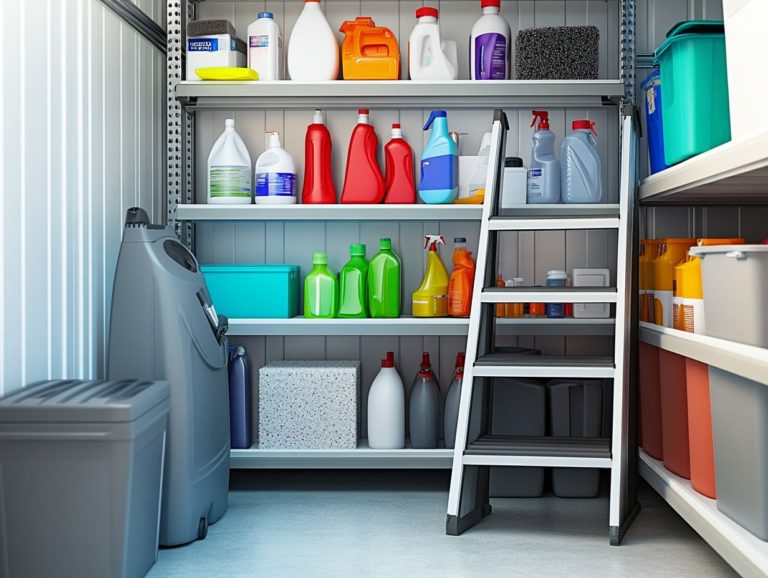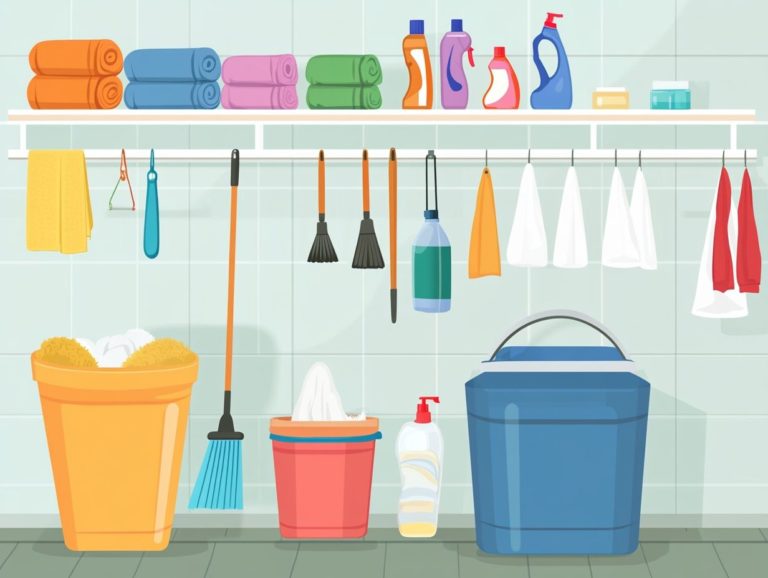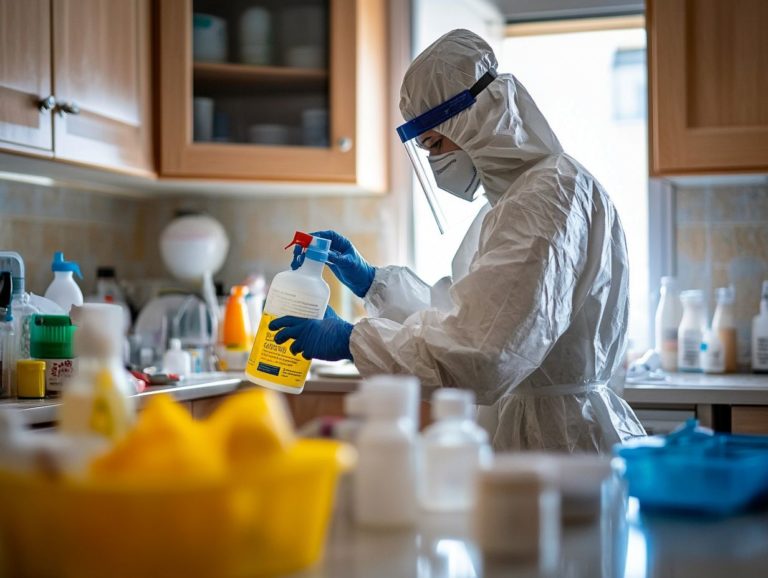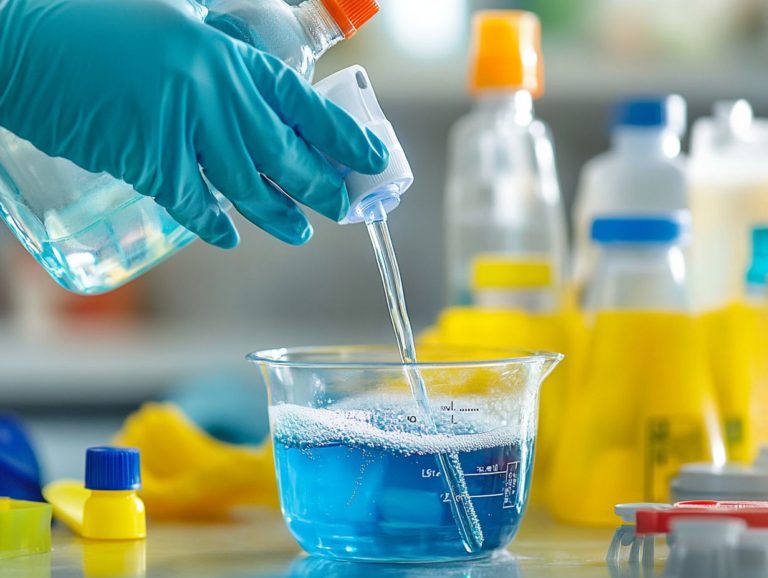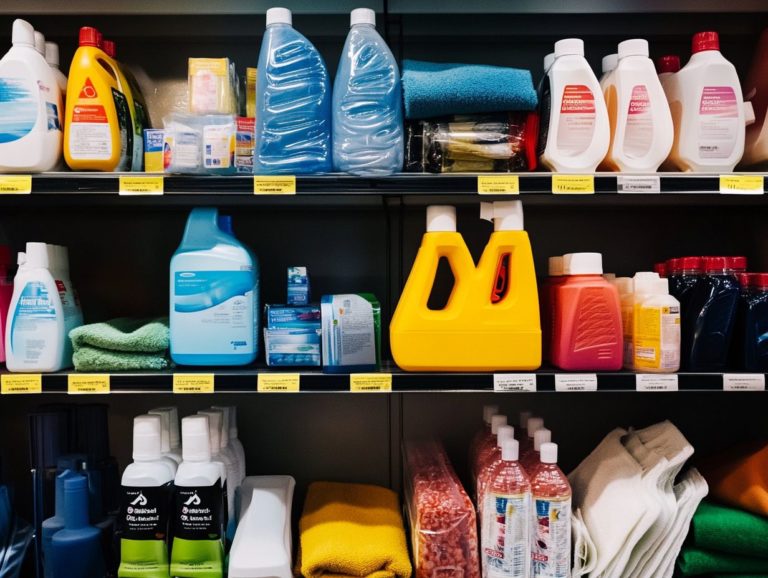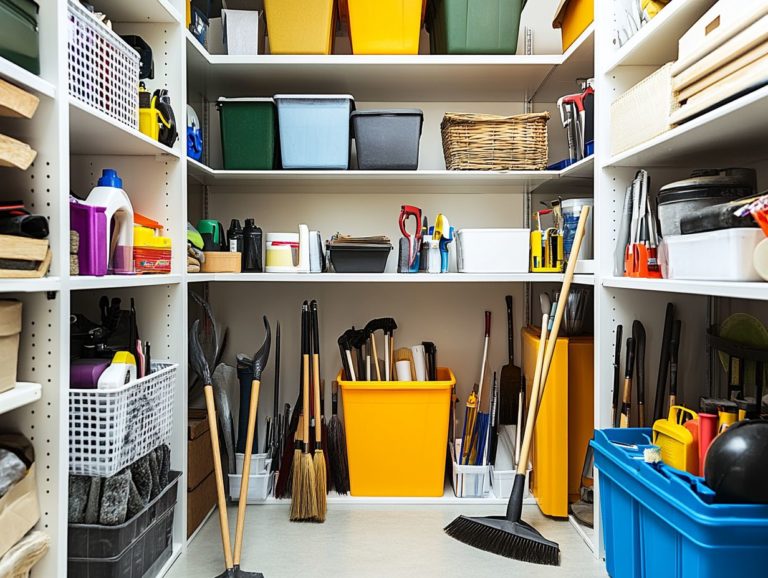How to Protect Cleaners from Humidity
Humidity plays a crucial role in influencing the effectiveness and longevity of your cleaning products and maintaining home equipment, especially in a humid area.
This article delves into the intricate relationship between humidity and cleaning supplies. It sheds light on how moisture impacts product performance and the integrity of your tools. You ll discover the signs of humidity damage, learn effective cleaning strategies to safeguard your cleaners, and identify the best products suited for humid environments.
We will outline essential safety precautions to keep your cleaning experience safe and efficient.
Equip yourself with this crucial knowledge to tackle humidity head-on!
Contents
- Key Takeaways:
- What is Humidity?
- What are the Effects of Humidity on Cleaners?
- What are the Signs of Humidity Damage on Cleaners?
- How to Spot Rust on Cleaning Equipment?
- How to Protect Cleaners from Humidity?
- What Are the Best Cleaning Products for Humid Environments?
- Essential Safety Tips for Cleaning in Humid Conditions
- Frequently Asked Questions
- What is humidity and why is it a concern for cleaners?
- How can I protect my cleaning supplies from humidity?
- Can I use my cleaning supplies if they have been exposed to humidity?
- What should I do if I live in a particularly humid climate?
- Are there certain types of cleaners that are more susceptible to humidity?
- What are the potential consequences of not protecting cleaners from high humidity?
Key Takeaways:
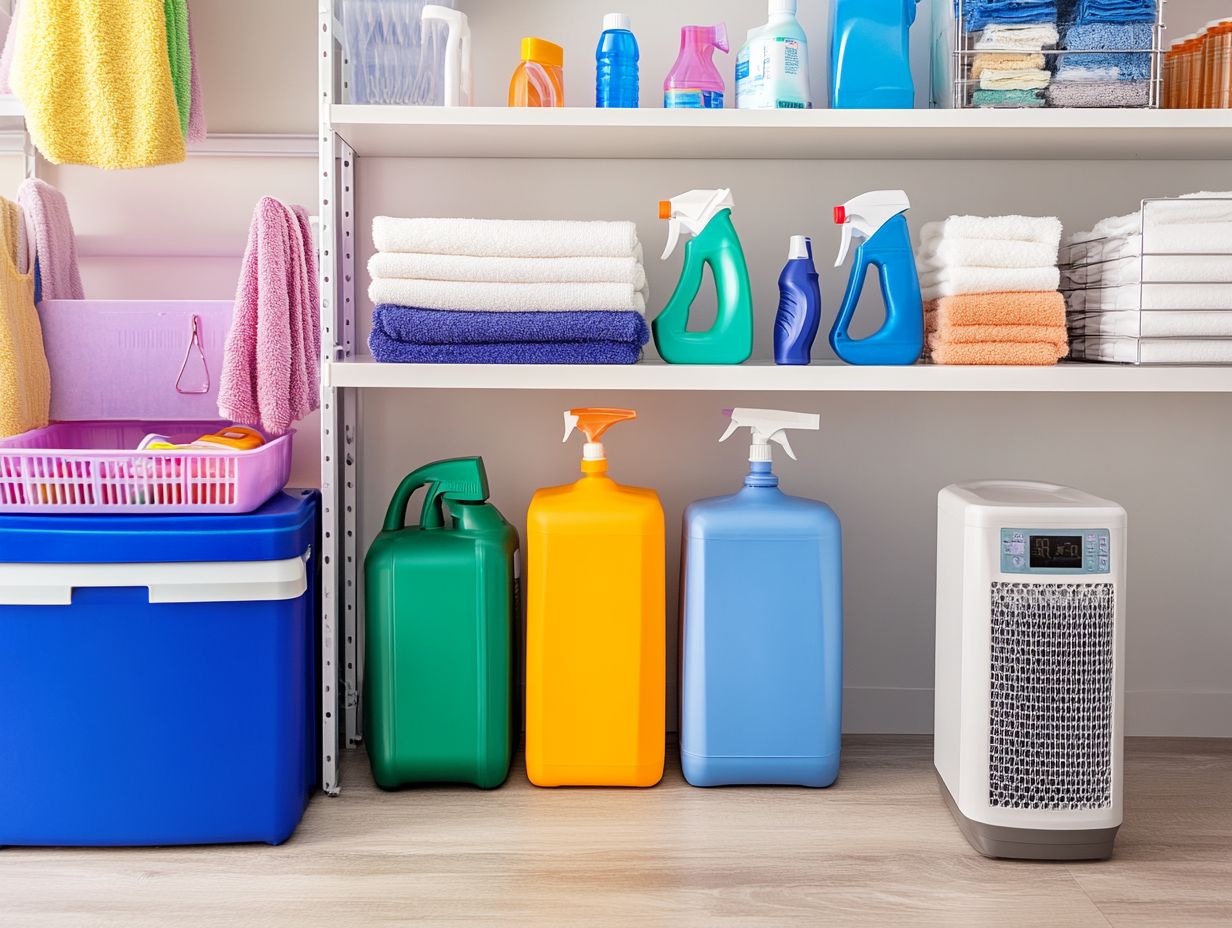
- Humidity can cause serious damage to cleaning products and equipment, leading to mold growth and rust formation.
- To protect cleaners from humidity, store products in a cool, dry place and regularly clean and dry equipment after use.
- When cleaning in humid environments, take safety precautions such as wearing protective gear, ensuring proper air circulation, and being aware of potential electrical malfunctions.
What is Humidity?
Humidity represents the concentration of water vapor in the air, and it can profoundly influence both indoor and outdoor environments. This is particularly true in coastal regions such as Charleston, Savannah, and Brisbane, where high humidity levels are a common consequence of their proximity to the Atlantic Ocean.
As humidity rises, it paves the way for complications. It can lead to mold growth and mildew buildup, which undermine indoor air quality and introduce unpleasant musty odors. Additionally, excess moisture can damage your furniture and encourage the presence of dust mites.
It’s essential to maintain a balanced humidity level for a healthy living space. An excess of moisture can damage furniture and promote a flourishing population of dust mites. Using tools like dehumidifiers (devices that reduce humidity levels) and air purifiers (which filter out pollutants) can significantly improve your environment.
What are the Effects of Humidity on Cleaners?
The impact of humidity on your cleaning efforts can be quite significant. When the air is saturated with excessive moisture, it can undermine the effectiveness of your cleaning products and strategies. This is especially true in regions where high humidity creates ideal conditions for mold and mildew.
These conditions also attract pests such as dirt mites and other unwelcome intruders. You may find that your cleaning solutions lose their potency or degrade more quickly. Mildew-preventing products might struggle to tackle the persistent moisture that attracts dirt mites. Regular maintenance and inspection of your cleaning supplies and equipment are essential for a clean environment.
How Does Humidity Affect Cleaning Products?
Humidity can significantly impact the performance and longevity of your cleaning products. High moisture levels encourage mildew buildup and mold growth, drastically reducing effectiveness. If you re using products that aren’t mildew-resistant, they may break down or lose potency over time.
Regular dusting and cleaning can help in mitigating some of these issues. It’s essential to grasp how humidity specifically affects different cleaning agents so you can approach cleaning in humid environments with a strategic mindset focused on moisture control.
This includes understanding the importance of HVAC (Heating, Ventilation, and Air Conditioning) maintenance and using dehumidifiers to reduce indoor moisture levels.
Selecting cleaning solutions tailored for high-humidity areas is crucial. For example, specialized mildew-preventing bathroom cleaners can effectively prevent mold from taking hold on surfaces, while anti-fungal sprays can be invaluable in your kitchen.
It s wise to look for products with a long shelf life; those that include preservatives are more likely to maintain their effectiveness, even when the moisture levels fluctuate. Incorporating natural moisture absorbers like vinegar and baking soda into your cleaning routine can enhance your strategy for tackling humidity-related challenges.
Using microfiber cloths for thorough cleaning can also make a significant difference. This thoughtful approach will help ensure your cleaning efforts remain efficient, no matter the conditions.
How Does Humidity Affect Cleaning Equipment?
Humidity can have a profound effect on your cleaning equipment, leading to rust and corrosion that can compromise both performance and longevity. In high-humidity environments, prioritizing regular maintenance and leak checks becomes essential to keep your equipment functional and effective.
By understanding how moisture interacts with different materials, you can make informed decisions. This knowledge helps with both your equipment choices and their care.
For example, metal components are particularly vulnerable to rust, so it s wise to regularly check inspections and apply protective coatings as needed. Non-metal components, like plastic or rubber, can also suffer when exposed to persistent moisture. This means you need to take a careful approach to both cleaning and storage. Implementing a cleaning schedule that includes regular inspections can significantly mitigate these risks.
Establishing a routine that includes thoroughly drying your equipment after each use and storing your tools in climate-controlled spaces can significantly reduce the damaging effects of humidity. Seeking professional maintenance services offers tailored guidance that considers your local conditions, ensuring your equipment remains in peak condition and operates optimally, no matter the humidity levels.
What are the Signs of Humidity Damage on Cleaners?
Recognizing the signs of humidity damage on your cleaning products is crucial for preserving a clean and healthy living space, especially in regions where mold and mildew thrive.
Look out for common indicators such as alterations in texture and diminished effectiveness; your once-reliable cleaners may appear clumpy or lose their potency due to moisture exposure. You ll need effective cleaning strategies to fix and prevent further damage.
By conducting regular inspections and maintaining your supplies, you can catch these issues early, ensuring that your cleaning efforts continue to be effective and your environment remains spotless.
How to Identify Mold Growth on Cleaners?
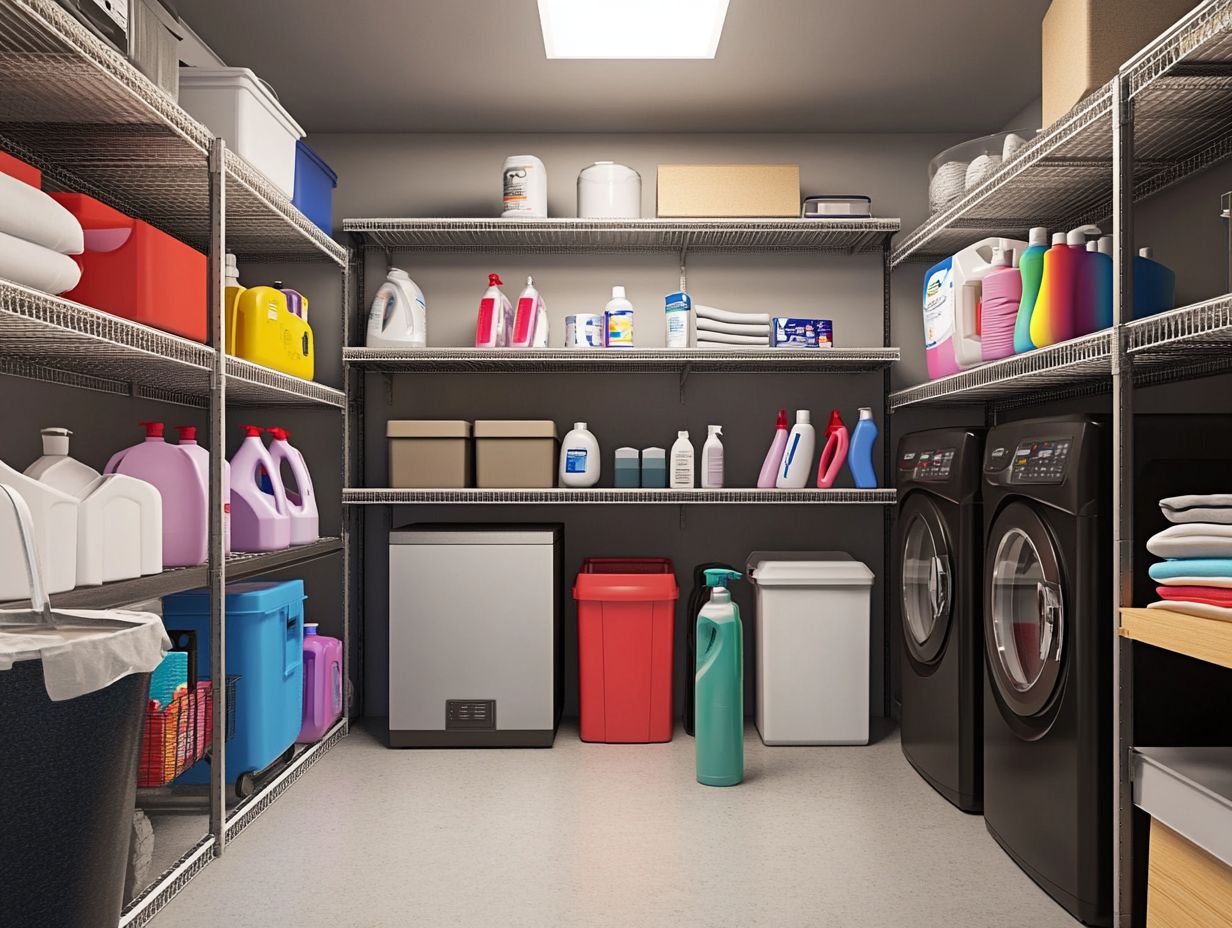
Identifying mold growth is crucial for a healthy home. It’s your first step in keeping your space fresh and clean! You might notice signs of mold, such as dark spots or a fuzzy texture on your cleaners, which can become more visible in high humidity. Regularly monitoring your supplies and employing ways to control moisture are fundamental for effective cleaning and preventing further mold development. Consider using mold prevention products to stop mold from forming.
To effectively identify mold on various cleaning products, it s wise to conduct thorough visual inspections. Pay close attention to corners and crevices where moisture loves to accumulate. Additionally, trust your senses; unusual musty odors can signal the presence of mold even before it becomes visible. Employing air purifiers can also help in reducing musty smells and improving indoor air quality.
Keeping your cleaning supplies in a cool, dry place is advantageous in discouraging mold growth. Implementing proper storage tips and preventive measures, such as:
- Using airtight containers for storage
- Ensuring proper ventilation in storage areas
- Regularly checking expiration dates
can make a significant difference. Outdated cleaners are often more susceptible to mold.
Implementing these strategies now can help you achieve a mold-free environment quickly! Regular dusting and thorough cleaning can further contribute to maintaining a healthy living space. Start your mold prevention journey today for a cleaner, healthier living space!
How to Spot Rust on Cleaning Equipment?
Spotting rust on your cleaning equipment is crucial for maintaining its functionality and effectiveness, especially in humid environments where moisture can speed up the corrosion process. You might notice common indicators of rust, such as discoloration, flaking, and a rough texture on metal surfaces. These signs can seriously impair performance.
By checking your equipment regularly and engaging in proactive maintenance, you can prevent rust from becoming a major issue. Implementing humidity control measures like using a dehumidifier can also help.
Make it a priority to inspect your equipment weekly, particularly if it’s exposed to high moisture levels. Pay close attention to joints and seams where water may accumulate, as these areas are especially vulnerable to rust development.
If you notice a dip in your cleaning equipment’s efficiency or hear unusual sounds during operation, these could be early warning signs that corrosion is starting to take hold. Don t wait! Tackle any minor rust the moment you see it. For complex issues, seeking professional help can ensure your equipment remains in optimal condition.
However, if the rust appears extensive or threatens the structural integrity of your equipment, it s wise to seek professional help. This ensures the safety and longevity of your tools.
How to Protect Cleaners from Humidity?
Protecting your cleaners from humidity is essential for preserving their longevity and effectiveness, especially in regions where elevated humidity can foster mold and mildew problems. Proper property maintenance and regular inspections are crucial in such areas.
By implementing proper storage strategies like utilizing airtight containers and storing cleaning solutions in a dry, cool environment, you can significantly reduce their exposure to moisture. Additionally, learning how to protect your cleaners from heat and using moisture-absorbing measures like baking soda can also help. These proactive steps will not only safeguard the quality of your products but also ensure they remain effective for all your cleaning needs.
How to Store Cleaning Products in Humid Environments?
Storing cleaning products in humid environments requires you to adopt specific strategies to prevent moisture exposure, which can lead to unwanted mold growth and mildew. Utilizing airtight containers and keeping your products in cool, dry locations are essential tips that help you control humidity levels and maintain the efficacy of your cleaning supplies.
Avoid direct sunlight to protect your solutions from degradation caused by moisture. Regular HVAC system maintenance and using dehumidifiers are also recommended for better humidity control.
To ensure optimal performance, it s crucial for you to choose containers specifically designed for humidity resistance. For example, high-density polyethylene or glass containers provide superior protection against moisture compared to standard plastic bottles.
Incorporating desiccants substances that absorb moisture to keep the environment dry into your storage spaces can absorb excess moisture, creating a drier environment for your cleaning supplies. Regularly inspecting your products for signs of spoilage or degradation will facilitate effective cleaning and maintenance, ensuring their longevity.
An organized approach to storing these products will not only enhance their shelf life but also promote safety within your home.
Take immediate steps to implement these strategies, and protect your cleaning equipment and supplies from humidity!
What Measures Can be Taken to Prevent Rust on Cleaning Equipment?
Preventing rust on your cleaning equipment is vital for maintaining optimal performance, especially in humid environments where moisture can accelerate corrosion. Regularly maintaining your equipment by cleaning and drying it after each use and storing it in a dry space can significantly reduce the risk of rust formation.
If you encounter severe rust issues, don t hesitate to call in the pros for help to restore your equipment’s functionality. Creating a maintenance schedule that includes periodic inspections will help you catch early signs of rust before they escalate into bigger problems.
Utilizing rust inhibitors or protective coatings on metal surfaces provides a strong defense against corrosion. It’s crucial to recognize how humidity can worsen rust issues, as high moisture levels can speed up the corrosion process.
For this reason, employing dehumidifiers in your storage areas and keeping your equipment away from water sources is highly advisable. If corrosion becomes extensive or involves intricate parts, enlisting professionals guarantees a thorough restoration, helping to ensure your equipment remains functional and lasts longer.
What Are the Best Cleaning Products for Humid Environments?
Selecting the finest cleaning products for humid environments is essential for preserving a pristine and healthy living space, especially in areas susceptible to mold and mildew. Opting for mildew-resistant formulations designed for effective cleaning can greatly improve moisture control, ensuring that surfaces stay clean and safeguarded against harmful pathogens.
Recognizing these specialized cleaning solutions is key to maintaining your home effectively.
What Types of Cleaning Products are Resistant to Humidity?
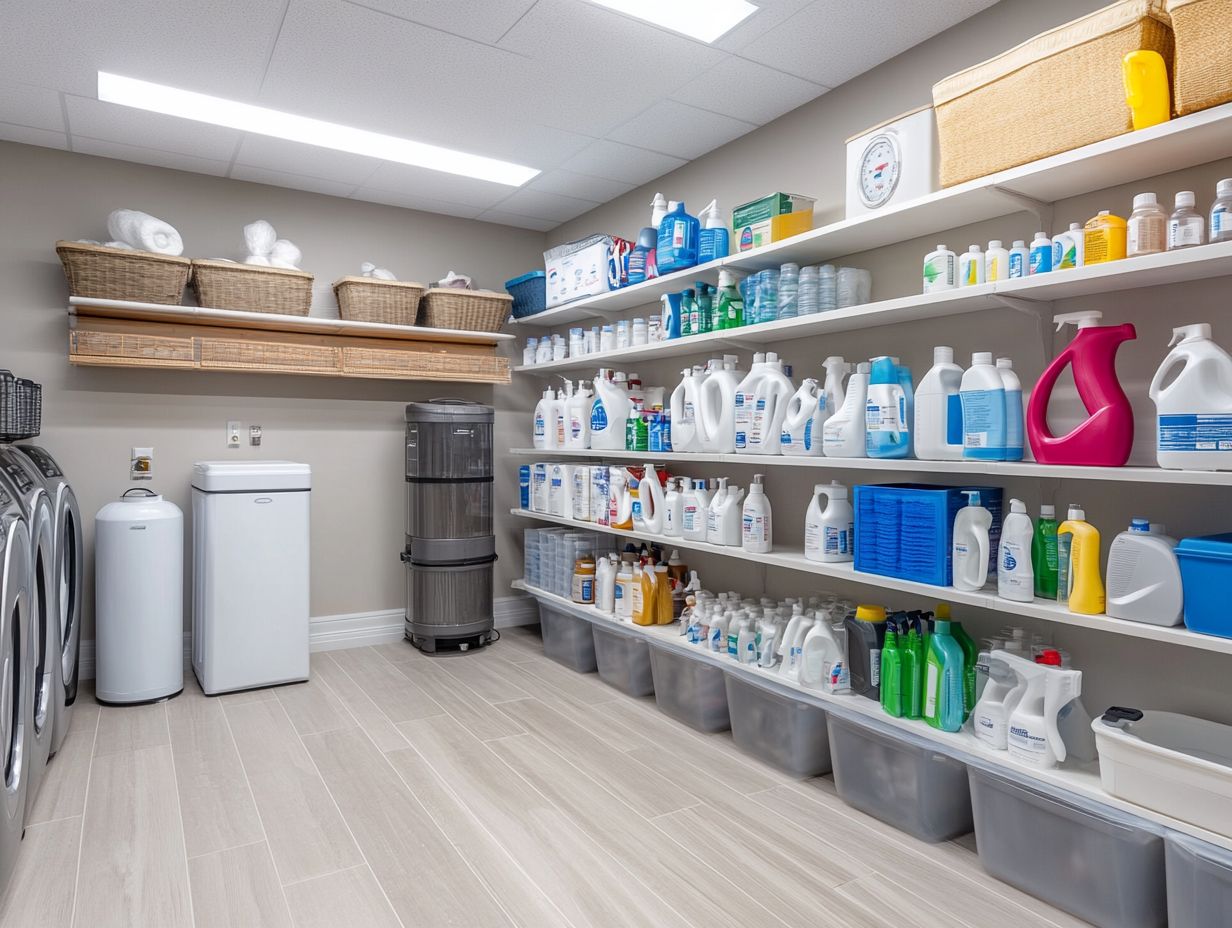
Cleaning products that resist humidity typically feature specialized formulations designed to tackle mold and mildew growth, ensuring effective cleaning even in high-moisture settings. You’ll often find these products labeled as mildew resistant, with ingredients specifically crafted to inhibit mold growth making them essential for maintaining indoor air quality in humid climates.
One popular choice is bleach-based cleaners, renowned for their powerful disinfecting capabilities. They penetrate tough stains while effortlessly cutting through grime. Another excellent option is enzyme-based cleaners, which break down organic matter that fosters mold growth making them particularly effective in kitchens and bathrooms.
Antimicrobial sprays and mist solutions offer long-lasting protection against moisture-related issues, effectively cleaning surfaces while creating a barrier to repel future mold growth. With these diverse options at your disposal, keeping your spaces clean and free from harmful moisture buildup is absolutely within reach, even in the most humid environments.
How to Choose the Right Cleaning Equipment for Humid Environments?
Selecting the right cleaning equipment for humid environments is vital for achieving effective cleaning and extending the lifespan of your tools. The right features can significantly counteract the adverse effects of elevated moisture levels.
To attain optimal results, focus on items specifically designed to endure moisture, such as vacuum cleaners with anti-corrosive finishes and durable molds. Equipment with robust suction power is essential for efficiently removing water and debris that tend to accumulate in these climates.
Additionally, opting for tools made from non-porous materials will help inhibit the growth of mold and bacteria, contributing to a healthier environment. Regular maintenance routines, such as cleaning and inspecting your equipment for signs of wear or corrosion, are crucial for enhancing functionality.
Ultimately, making informed decisions in this regard can lead to a more efficient cleaning process and improved moisture control.
Essential Safety Tips for Cleaning in Humid Conditions
When cleaning in humid environments, it’s crucial to take safety precautions to mitigate the risks of mold exposure and potential equipment malfunctions. Both can compromise your health and the effectiveness of your cleaning efforts.
Prioritize protective gear like gloves and masks to shield yourself from harmful substances released by mold. Regularly inspect your cleaning equipment to avoid accidents and ensure everything operates smoothly.
Your well-being and the quality of your work deserve this level of diligence.
How to Protect Yourself from Mold Exposure?
To safeguard against mold exposure while cleaning in humid environments, follow important safety steps. Equip yourself with protective gear, such as masks and gloves, to minimize direct contact with mold spores.
Make it a habit to ventilate the space while you clean. This simple act can significantly reduce airborne mold particles, creating a safer atmosphere during and after your tasks.
Consider using air purifiers with HEPA filters, which are high-efficiency particulate air filters that trap tiny particles, including mold spores. Whenever possible, work in areas where you can open windows; fresh air circulation is vital for lowering humidity levels, which discourages mold growth.
Maintain humidity levels below 50%. Using dehumidifiers can assist you in reaching that target. After cleaning, dispose of any contaminated materials properly, and wash your hands and any exposed skin thoroughly.
This will help minimize your risk of mold-related health issues and keep you feeling your best. Don’t wait implement these safety measures today for a healthier cleaning experience!
What to Do in Case of Electrical Equipment Malfunction Due to Humidity?
Act quickly! If you encounter an electrical equipment malfunction caused by humidity, take immediate safety precautions. Start by disconnecting the equipment and ensuring the area is dry before making any repairs.
Assess the extent of the damage and consider reaching out for professional assistance; this is crucial for restoring functionality safely, especially in humid environments where moisture can lead to ongoing complications.
Ventilating the area is also advisable to dissipate lingering moisture in the air and prevent further damage. Regular maintenance checks are essential for extending the lifespan of your electrical devices. Inspect for any signs of corrosion or wear and tear due to dampness.
If issues persist or if the damage seems significant, don t hesitate to contact a certified technician. A professional’s expertise is vital, particularly for complex or hazardous repairs, ensuring both your equipment and safety are safeguarded.
Frequently Asked Questions
What is humidity and why is it a concern for cleaners?
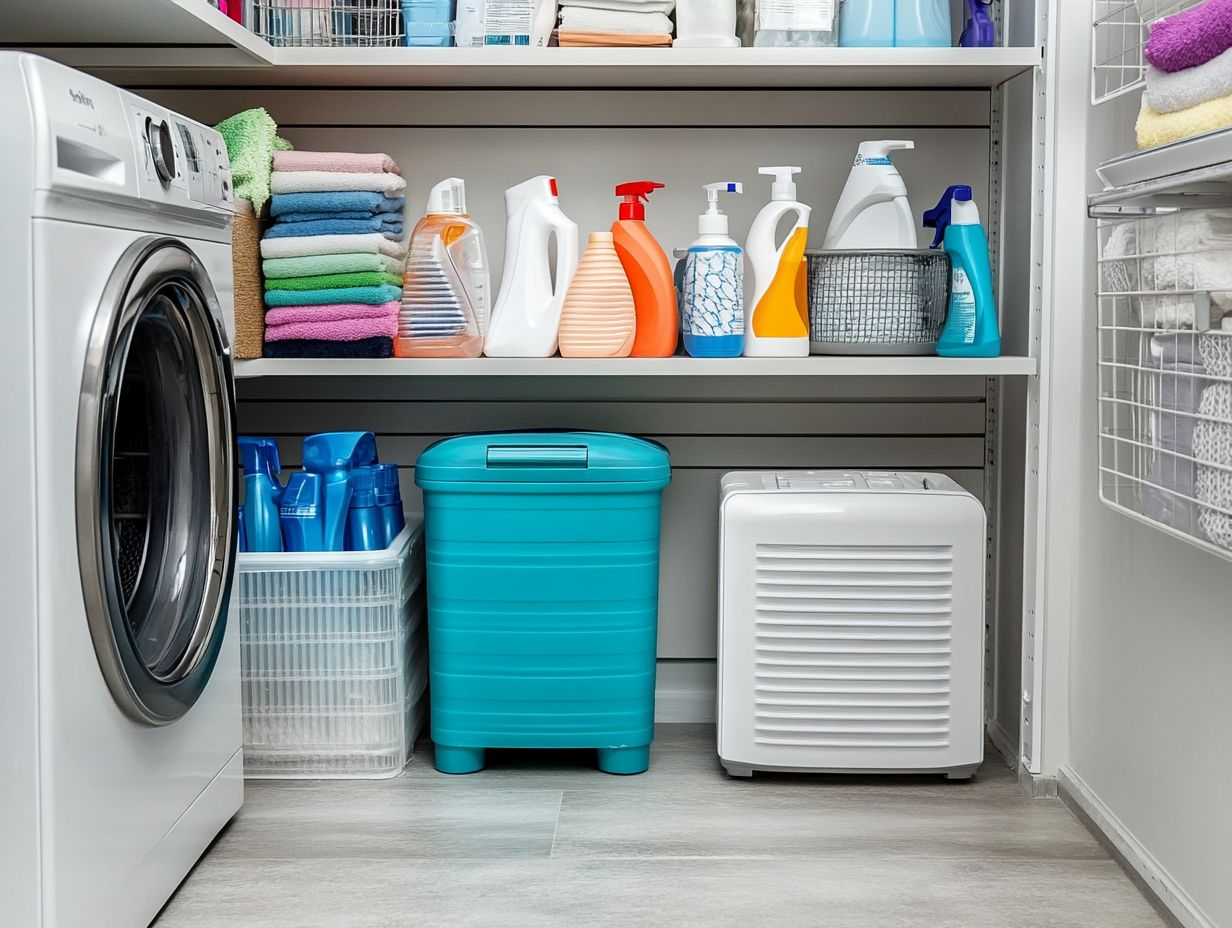
Humidity refers to the amount of moisture in the air. Excessive humidity can cause cleaning supplies to become damp or moldy, leading to potential damage or loss of effectiveness.
How can I protect my cleaning supplies from humidity?
There are a few ways to protect your cleaning supplies from humidity. Store them in airtight containers or bags to prevent moisture from entering. You can also use silica gel packets or dehumidifiers in the storage area to absorb excess moisture.
Can I use my cleaning supplies if they have been exposed to humidity?
If your cleaning supplies have been exposed to excess humidity, it is best to discard or replace them. The moisture can lead to a loss of effectiveness, potential mold growth, and can compromise the safety of the product.
What should I do if I live in a particularly humid climate?
If you live in a humid climate, it’s important to take extra precautions to protect your cleaning supplies. Consider storing them in a cool, dry place like a closet or cabinet. You may also want to invest in a dehumidifier for your storage area.
Are there certain types of cleaners that are more susceptible to humidity?
Yes, certain types of cleaners, like powdered or granulated products, are more susceptible to humidity. They can clump or harden when exposed to moisture, making them useless.
What are the potential consequences of not protecting cleaners from high humidity?
Not protecting your cleaners from high humidity can lead to several issues. You may experience loss of effectiveness, mold growth, mildew buildup, and even damage to the packaging.
This can cause musty odors and affect the safety of the product, potentially harming users or surfaces. Act now to protect your cleaners and ensure they work effectively! Use dehumidifiers and maintain air circulation. You might also want to seek professional help if necessary.

